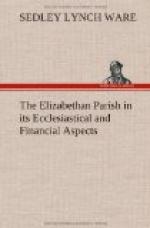At the visitation held at Romford Chapel, Essex Archdeaconry, 5th September, 1578, the wardens of Dengie “broughte in theire surplice, which surplice is torne & verie indecent & uncomly, as appereth; whereupon the judge, for that theie neglected their othes, [ordered them to confess their fault and prepare] a newe surplice of holland cloth of v s. thele [the ell], conteyninge viii elles, citra festum animarum prox.” Remembering that money was then worth ten to twelve times what it is today, this was probably considered too great a burden by the parishioners of Dengie. A petition must have been presented to be allowed to procure a cheaper surplice, for on the 6th October following the wardens were permitted to prepare a surplice containing six ells only at the reduced price of 2s. 8d. per ell.[29]
It seems to have been the practice in the Dean of York’s Peculiar for the judge to threaten the churchwardens occasionally with a fine for failure to repair their church or supply missing requisites for service by a fixed day. Thus at Dean Matthew Hutton’s visitation, July, 1568, the churchyards of Hayton and of Belby were found to be insufficiently fenced. The order of the court was: “Habent ad reparanda premissa citra festum sancti Michaelis proximum sub pena XX s."[30]
So, too, the Thornton wardens at the same visitation are warned to repair the body of their church “betwixt this and Michlmes next upon paine of X s."[31] But as spiritual tribunals had no legal power to fine[32] or to imprison, apparently the usual penalty prescribed by the judges in case of disobedience to, or neglect of, their orders to repair or replace by a certain day, was, in the words of Bishop Barnes addressed to the churchwardens in Durham diocese, the “paynes of interdiction and suspencion [i.e., temporary excommunication] to be pronounced against themselves."[33] Yet here, too, the wardens did not escape indirect amercement, for absolution from interdiction or excommunication often meant a payment of various court fees, which in many cases were by no means light. These fines the wardens put to their credit in the expense items of their accounts if they could possibly do so, and it is probable that the parish always paid them except in cases of very gross individual delinquency in office. Thus the wardens of St. Martin’s, Leicester, record: “Payd to Mr. Comyssarye whe[n] we was suspendyd for Lackynge a Byble & to hys offycers xxiij d."[34] The wardens of Melton Mowbray register: “Ffor our chargs & marsements at Lecest[e]r ... for yt ye Rood loft whas not takyn down & deafasyed iiij s. iiij d."[35]
In the same accounts we find some years later: “Payde to ... at the vicitacion houlden at Melton for dismissinge us oute of there bookes for not reparinge the churche iij s. ij d."[36] So, also, we read in the St. Ethelburga-within-Bishopsgate Accounts: “Paid in D[octor] Stanhope’s courte beinge p[re]sented by p[ar]son Bull aboute the glasse windowes xvj d.” And nine years later: “Paid for Mr Gannett and myselfe [’Humfery Jeames’] for absolution iiij s. viij d.” Also: “Paid for our discharge at the courte for [from] our excomm[uni]cacon xvj d."[37]




